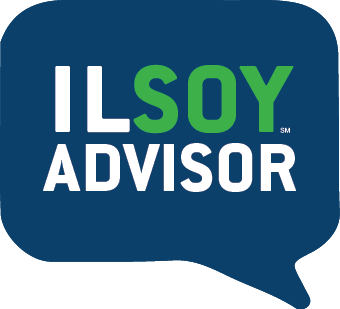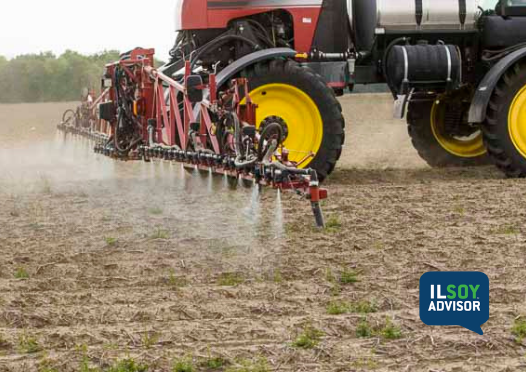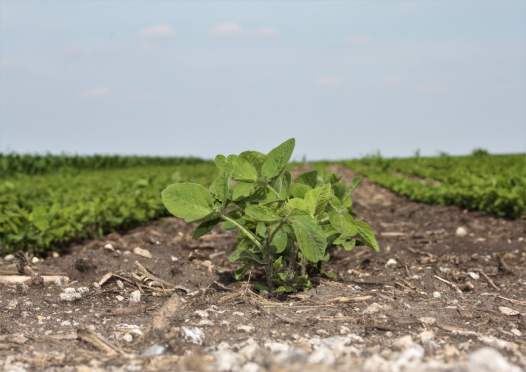Spring is in the air! The grass is greening up, the songbirds are back serenading us, each day is getting longer, the daily temperature is sort of warming up, and snow is changing to rain (for the most part). But that is the problem, isn’t it? Temps are staying lower than average, and the precipitation does not seem to want to stay away for longer than a 48-hour stretch, at best. In Champaign, the average temperature for the month of April so... Read More →
ILSOYADVISOR POST
Fungicide-Herbicide Compatibility
August 16, 2018
Fungicide applications can be viewed as a “free trip” for some herbicides, but make sure you are spraying on-label. If not, it could be costing you more than just bushels.
As we are approaching the tail end of the growing season, many growers and ag retailers are wrapping up soybean fungicide applications this week. August is a make-or-break month for soybean growers across Illinois. And while there are areas affected with drought throughout the state, most of the soybean acres look fantastic. I am betting that we’ll see some of the biggest soybean yields coming out of the 2018 crop.
While fungicide applications on corn have been common practice for Illinois producers for at least a decade, soybean fungicide applications are just beginning to gain traction as a trend in grower’s management and IPM programs.
The one management program that many Illinois growers have had to change is their weed control. Several species of driver weeds in Illinois are resistant to multiple herbicide modes of action, the biggest being glyphosate-resistant waterhemp. And while the Liberty Link® and Dicamba Tolerant soybean technologies have helped growers combat these resistant weed species, even the best of us have weeds escape to harvest. With fungicide becoming a planned pass, it’s all too easy to think about throwing in a herbicide application to clean up the stragglers. While this is a convenient trip, it is more than likely an off-label application.
Here are a few guidelines from the Liberty® and Engenia® herbicide labels:
Liberty
- Applications of Liberty 280 SL Herbicide on soybeans may be made from emergence up to, but not including, the bloom growth stage (R1).
- DO NOT apply Liberty 280 SL Herbicide if soybeans show injury from prior herbicide applications or environmental stress (drought, excessive rainfall, etc.).
- DO NOT apply Liberty 280 SL Herbicide within 70 days of harvesting soybean seed.
Engenia (DT soybeans only)
- DO NOT apply Engenia Herbicide to soybeans after first bloom (R1).
- Use caution when tank mixing Engenia with approved emulsifiable concentrates (EC) or oil-based products that may increase the potential for crop injury.
According to the label, any application of Liberty at, or after, the R1 growth stage is off-label. Most fungicide applications are applied between the optimal growth stages of R2-R3 (full flower and beginning pod). Liberty, applied with a high load of spray grade ammonium sulfate, will more than likely knock off several bushels per acre of top end yield. From my experience, growers can lose anywhere from 1 – 8 bushels. While letting weeds escape and reproduce seed can be hard for a grower to accept, off-label applications of herbicides can be an even greater risk.
Engenia has a cutoff up to and including beginning bloom (R1), which again is not optimal timing for foliar fungicides. I do not have any experience in dicamba applications after R1, and I cannot attribute any yield loss from one. However, a dicamba-tolerant soybean must metabolize the herbicide just like any other plant. This takes time and resources from the plant that are more valuably used during the reproductive stages it is currently in.
Good stewardship is another reason we shouldn’t be applying herbicides off-label with fungicides. Off-target drift from dicamba or glufosinate (Liberty) can lead to crop injury in non-tolerant crops as well as non-crop species and ornamentals. Dicamba injury that is sustained during the reproductive stages versus the early vegetative stages can have a significant impact on yield.
At the end of the day, the label is the law, and from my experiences when the label is followed correctly products perform as they should. It’s up to us to be the best stewards that we possibly can, and we must preserve these technologies for our generation as well as for future ones.





Comments
Add new comment